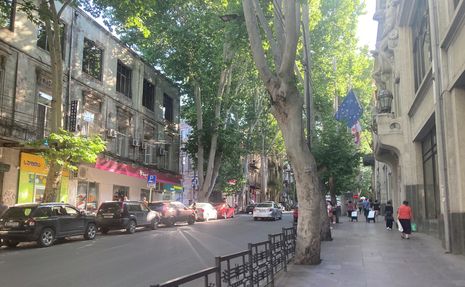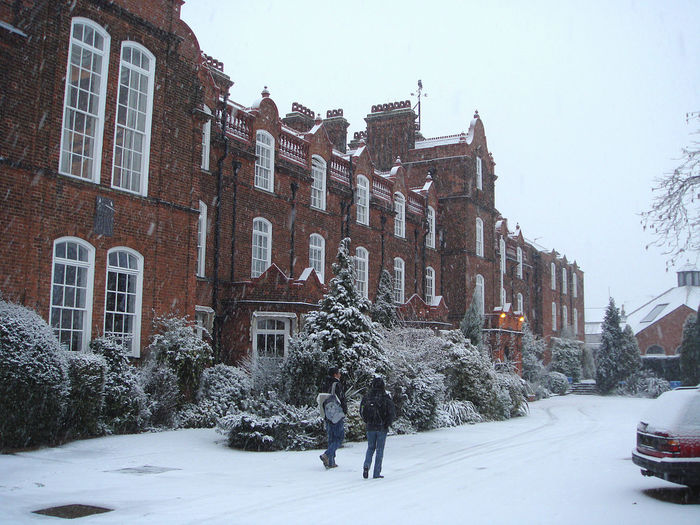How to learn a language nobody wants to hear
James Lewis describes his experience of spending a year abroad learning Russian in uneasy Tbilisi

Every Sunday in Georgia’s capital Tbilisi some Russians host a kvartirnik, or home concert. It’s a cute tradition from Soviet times where people gather in an apartment to play guitar, sing, and have a few drinks. I go when I can. Not because I have any singing ability – although learning the chords to a classic by Kino or Akvarium is a sure-fire way to endear yourself to most Russians – but because when you’re on your year abroad for Russian in a country where it’s a minority language, a regular speaking opportunity like this is invaluable.
If you want fluency here, you have to actively seek out pockets of Russian throughout the city. This didn’t come as a surprise to those of us who picked Georgia from a list of contingency year abroad destinations, after Putin’s full-scale invasion of Ukraine made studying in Russia itself impossible. But there’s not just a practical barrier to speaking Russian in Tbilisi, there’s an ever-present political one. Georgia was of course a territory of the Russian empire and the Soviet Union. Since the Russo-Georgian war of 2008, two regions of Georgia, Abkhazia and South Ossetia, have been under Russian occupation. Add to that Georgia’s sense of solidarity with Ukraine, and you go part of the way towards explaining the good amount of ill will directed towards the influx of Russians to the city since war broke out.
“Suffice to say, the sound of Russian is grating for some”
On what seems like every street corner is graffiti reading “Glory to Ukraine” or “Fuck Russia”. EU flags are omnipresent and were wielded by protestors facing tear gas and water cannons during demonstrations against a new “foreign agents” law that they believed appeased the Kremlin in March. Suffice to say, the sound of Russian is grating for some.
On the way back from said kvartirnik I’m approached by an imposing Georgian man who I’ve just seen arguing with some people off in the distance. He asks me where I’m from. I figure that this isn’t the time to see if he’s heard of Wales (although Georgia’s shock rugby victory against us last year means that many people here have) and tell him I’m English. He seems satisfied, and then shows me his bloodstained arm, ‘this is Russian blood’, he says, before heading on down the road in good spirits. While this was a more extreme encounter, this kind of sentiment is everywhere. In bars, anti-Russia slogans abound, with a placard in one carrying the proviso that by entering the bar you recognise Russia’s crimes. At some point early in my placement I stupidly struck up a conversation in Russian there. One of the bar staff came over and told me that he knew I spoke English and should stick to it. Nowadays I generally do.
“One of the bar staff came over and told me that he knew I spoke English and should stick to it. Nowadays I generally do”
Unless, of course, I find myself in those ‘pockets’ around town where Russian can be used freely. The language school here finds some of them for us, organising weekly meetings with Russian-speaking activists, artists, and members of NGOs. Sometimes they’re many things at once. These people are no apologists for Russian imperialism. You can’t help but feel some sympathy for these groups, who in many cases have no idea when they’ll be able to go home and have to contend with the fact that no matter how much they oppose their country’s actions, their very language provokes derision. There’s a lethargic melancholy to many of them; aside from the volunteers that provide food and medicine for Ukrainians, it’s not always clear how they pass their time.
One week we meet a progressive bookshop owner who talks like he doesn’t really want us to be there. He mutters something about his dislike for those who frequent bars, saying he prefers to buy a bottle of wine and bring it home. Accordingly, in the courtyard outside – one of the city’s many pretty “Italian” courtyards – is an impressive collection of empty bottles gathering dust. I’ve seen him at one of the volunteer organisations sometimes, but he clearly has downtime to spare.
Another week we meet some Georgians born in Abkhazia who grew up in Russia and now run an NGO. They talk to us a little about the complexities of their background before lapsing into an argument among themselves about whether Georgia is European. One of them turns to me and asks with great intensity whether Byzantium qualified as well. I get the impression that they devote a lot of time to aimless talk. It’s frustrating to see people who no doubt wish they could be doing more while away the hours like this.
This sense of lingering frustration, from Georgians and Russians alike, permeates the town. As outsiders, all we can do is take it all in and know when to speak Russian, and when not to.
 News / Cambridge students set up encampment calling for Israel divestment6 May 2024
News / Cambridge students set up encampment calling for Israel divestment6 May 2024 News / Cambridge postgrad re-elected as City councillor4 May 2024
News / Cambridge postgrad re-elected as City councillor4 May 2024 News / Proposed changes to Cambridge exam resits remain stricter than most7 May 2024
News / Proposed changes to Cambridge exam resits remain stricter than most7 May 2024 News / Some supervisors’ effective pay rate £3 below living wage, new report finds5 May 2024
News / Some supervisors’ effective pay rate £3 below living wage, new report finds5 May 2024 Fashion / Class and closeted identities: how do fits fit into our cultures?6 May 2024
Fashion / Class and closeted identities: how do fits fit into our cultures?6 May 2024






